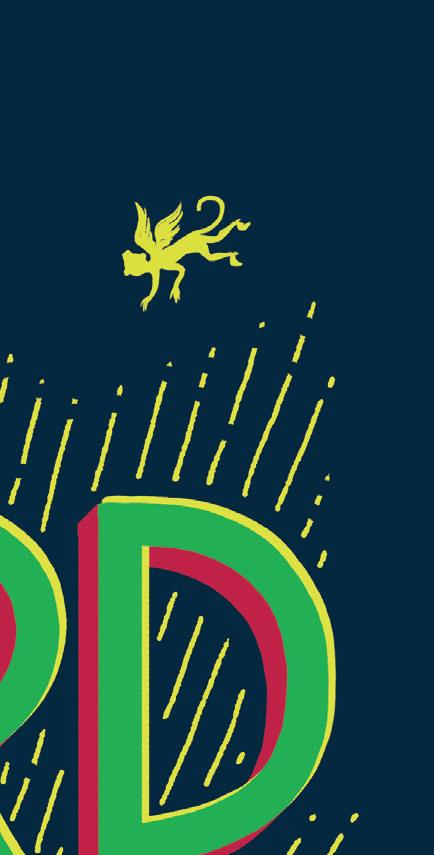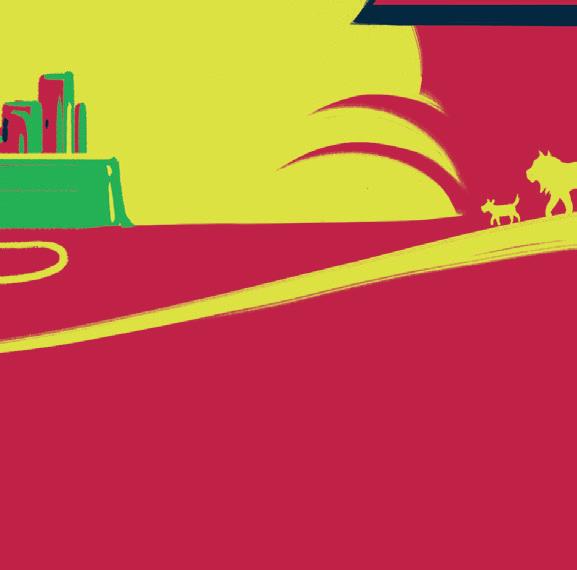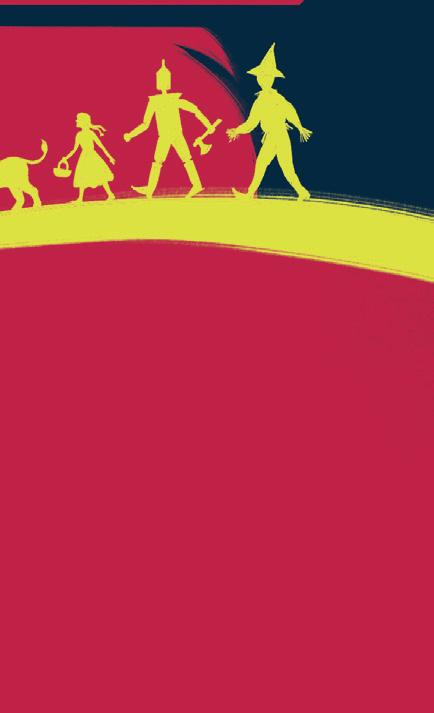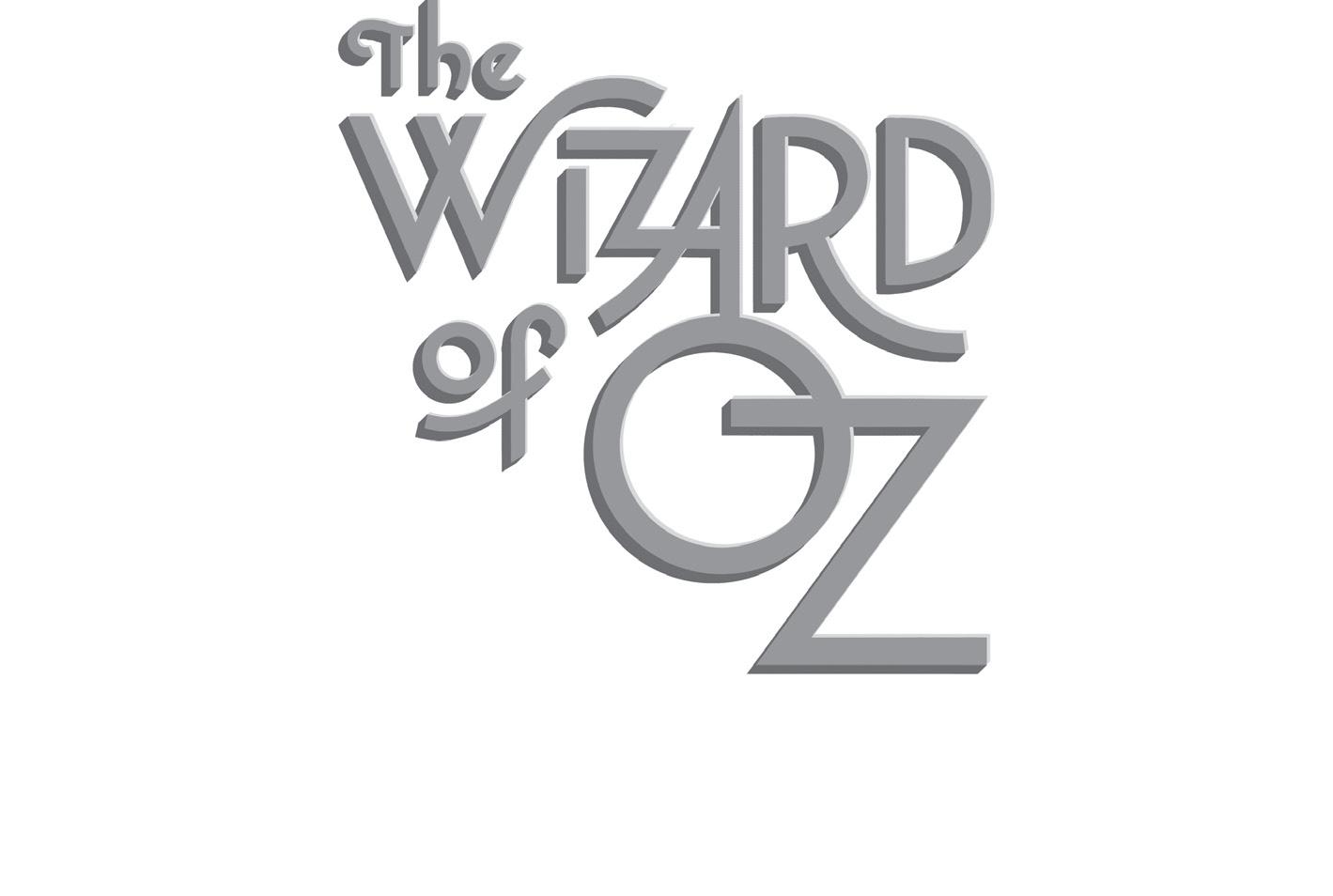















introduced by CHRIS RIDDELL


‘Come along,Toto,’ she said.‘Wewill gotothe Emerald Cityand ask the great Oz how to get back to Kansas.’

Illustrations by D avid M c K ee
UK | USA | Canada | Ireland | Australia
India | New Zealand | South Africa
Puffin Books is part of the Penguin Random House group of companies whose addresses can be found at global.penguinrandomhouse.com.
www.penguin.co.uk
www.puffin.co.uk www.ladybird.co.uk
First published in the USA 1900
First published in Puffin Books 1982 Reissued 2009, 2012, 2015 This edition published 2024 001
Illustrations copyright © David McKee, 1982 Introduction copyright © Cornelia Funke, 2008 Endnotes copyright © Penguin Books, 2008
The moral right of the author and illustrator has been asserted.
Set in Minion by Palimpsest Book Production Limited, Falkirk, Stirlingshire Printed and bound in Great Britain by Clays Ltd, Elcograf S.p.A.
The authorized representative in the EEA is Penguin Random House Ireland, Morrison Chambers, 32 Nassau Street, Dublin d02 yh68
A CIP catalogue record for this book is available from the British Library
978–0–241–73426–1
All correspondence to: Puffin Books
Penguin Random House Children’s
One Embassy Gardens, 8 Viaduct Gardens, London w11 7 w
Penguin Random Hous e is committed to a sustainable future for our business, our readers and our planet. is book is made from Forest Stewardship Council® certified paper.
introduction by
I was born in Germany,whereyoudidn’t read The Wizard ofOz as a child but JimKnopfandLucas the Steam Engine Driver, Pippi Longstocking or Emil andthe Detectives,and maybe TomSawyer (I readthat atleast a dozentimes), but not The WizardofOz.
Surelythat storywas not a book? It was a movie– a famous movie,with an adult woman dressed up as a girl, with lots ofsingingand veryevil witches – wasn’tit?
I can’trememberexactly how old I was whenI found out that originally there was a book (as so oftenwith great stories)telling thetale ofthe Cowardly Lion,the Tin Woodman who thinks he has no heart,andthe Scarecrow who believeshehas no brains.ButI was a so-called adult whenI first read it.TodayI owntwoquitedifferentcopies ofthisbook:aGermanone with wonderful illustrations byLisbeth Zwerger (my favourite being the one where the TinWoodman and the Scarecrow carrythe sleeping Dorothy throughthe Deadly Poppy Field);and another
one in English – theAmerican first edition,with all its pages illustratedbutonlyin greenand red,as it was hard (andexpensive) to print colour atthat time.
When I startedtowritethis introduction,Itook the twobooks from my shelfand put themon my writing desk – and justlooking at them made me realize,once again,what a timeless and unforgettable storyL.Frank Baum told.Onlythe best storiesinspireillustrators all over the world to findtheir own(and oftenvery different) images for one story,because only veryspecial stories create characterswho speak toall ofus,allover this world, who personify deeply human matters – the weaknesses and virtues,feelings and thoughts we all share.
Althoughmy first edition (which means it is quite an old book!) shows the Tin Woodman in almost the same waymyGerman(and quite new) book does,other characters are drawndifferently– for example,onlyin the old book does the Lion wear a crown,and the Scarecrow is muchfatter in the new one.Nevertheless,whichever waythe reader or illustratorimaginesthem,thecharacters in this storyareunforgettable and overthe many years The WizardofOz has been told,readers havegivenits characters new faces,new clothes,new shapes,but still theyremain the one and only Lion,Scarecrow,Tin Woodman andWizard.
That is another wonderful thing about a great storylike this:itchanges all the time with thereaders it finds.No vi
child today willimagineDorothy with pigtails as she is portrayedin my first edition,but howeveryouimagine her it willstill be Dorothy,acharacterasimmortalas a printedpage can grant.
Butwhy exactly isthis storya great story?I am tempted tosayyoushould find out foryourself,asI believethat everyreader finds another storybetweenthe pages ofa book.Ifyou don’tlikeit,itis oftennot the storythat is toblame,justthe fact that it was not the rightone for you.The bettera storyis,themorereaders will find themselves in it – and each one will find something that seems to be there especially for him or her:acertain episode or character,sometimes asentence,that gives us the words for something we alwaysknew,but neverhad the words for.
Yes,that’s what storytelling is all about:word fishing –and giving birth to characters from these words. When we remember a story,whatdowe remember most? The storyitselforits characters? Don’tthese characters sometimesfollow us throughall our liveslike good friends? That’sanother kind ofmagica great story can weave. The WizardofOz will make you meet three quiteunforgettable characters.Your ownbeating heart will suddenly remind you ofthe Tin Woodman,whoso desperately longs to havesucha heart.Each scarecrow yousee in a field willmakeyouask yourselfwhetherthis one would also like to walk awayto find a brain.And
everylion’s roarwill remind you ofthe Cowardly Lion, who touchedyour heart in the kingdom ofOz.Thisis another thing a great storycan do:it adds another reality tothe one we see.It weavesanother storyintoour own story and makes them all one – as they probably are anyway.
So,open the book and start travelling throughthe pages.It willbequitea journey,and you won’t comeback the way youstarted,whichis truefor all journeys, especially writtenones.Accept the invitation ofthe printedletters and stepinto the strange land ofOz.And ifyou are luckierthan me,you’llgo there whileyou are still a child.
Dorothy livedinthe midst ofthe great Kansas prairies, with Uncle Henry,who was a farmer,and Aunt Em, who was the farmer’swife.Their house was small,for the lumber to buildit had to be carried by wagon many miles. Therewere four walls,a floor,and a roof,whichmade one room;andthis room contained a rusty-looking cooking stove,acupboardfor the dishes,a table,threeor four chairs,andthe beds.UncleHenry andAunt Em had a big bedin one corner and Dorothya little bed in another corner.Therewas no garretatall,andno cellar –except a small hole,dug in the ground,called a cyclone cellar, wherethe family could go in case one ofthose great whirlwinds arose,mightyenoughtocrushanybuilding in its path.Itwas reached by atrapdoor in the middle ofthe floor,fromwhicha ladder led downintothe small, darkhole.
When Dorothystoodin thedoorwayand looked around,she could see nothing but the great greyprairie on every side.Nota treenor a house brokethe broad
sweepof flatcountry that reached to the edge ofthe sky in all directions.Thesun had baked the ploughed land intoa greymass,with little cracks running throughit. Even the grass was not green,for the sun hadburnedthe tops ofthe long blades until they werethe same grey colour to be seen everywhere.Oncethe house had been painted,butthe sun blisteredthe paint and the rains washed it away,and now the house was as dull and grey as everything else.
When Aunt Em camethere to liveshe was a young, pretty wife.The sun and wind had changed her,too.They had taken the sparkle from her eyesand left them a sober grey;theyhad taken the redfromher cheeks and lips,and theywere greyalso.She was thin and gaunt,andnever smiled now.WhenDorothy,who was an orphan, first came to her,Aunt Em hadbeen so startled by the child’s laughterthat she would scream andpress her hand upon herheart wheneverDorothy’s merryvoicereached her ears;andshestill looked at the little girlwithwonder that she could find anything to laughat.
Uncle Henry neverlaughed.Heworkedhardfrom morningtill night and did not know what joy was.He was greyalso,from his long beard to his roughboots,and he looked sternand solemn,and rarelyspoke.
Itwas Totothat made Dorothylaugh,and savedher fromgrowing as greyasher other surroundings.Toto was not grey;hewas a little black dog,with long silky hair
and small black eyesthat twinkled merrily on eitherside ofhisfunny,weenose.Totoplayed all day long,and Dorothy playedwith him,and lovedhim dearly.
Today,however,theywere not playing.UncleHenry sat upon the doorstep and looked anxiously at the sky,which was evengreyer than usual.Dorothy stood in the door with Totoinher arms,andlookedatthe sky too.Aunt Em was washing the dishes.
From the far north they heard a low wail ofthe wind, and Uncle Henry and Dorothycould see where the long grass bowedinwavesbeforethe coming storm.Therenow came a sharp whistling in the air from the south,and as theyturnedtheir eyesthat way they saw ripples in the grass coming fromthat direction also.
Suddenly Uncle Henry stood up.
‘There’sa cyclone coming,Em,’hecalled to hiswife. ‘I’ll go look after the stock.’Then heran towardsthe sheds wherethe cowsand horses werekept.
Aunt Em dropped her workand came to thedoor.One glancetold her ofthe danger close at hand.
‘Quick,Dorothy!’she screamed.‘Run for the cellar!’
Toto jumped out ofDorothy’sarmsand hid under the bed,andthe girlstartedtoget him.Aunt Em,badly frightened,threwopen the trapdoor in the floor and climbed downthe ladder into the small,darkhole. Dorothy caught Totoatlast,andstartedtofollowher aunt.Whenshe was halfway across the room there came
a great shriek from the wind,andthe house shook so hard that she lost her footing and sat downsuddenly upon the floor.
A strange thing then happened.
The house whirled around two or three times and rose slowlythrough the air.Dorothyfelt as ifshe weregoing up in a balloon.
The north and south winds met where the house stood, and made it the exact centreofthecyclone.Inthe middle ofacyclonethe air is generally still,butthe great pressure ofthewind on every sideofthe house raised it up higher and higher,until it was at the verytop ofthe cyclone;and thereit remained and was carried miles and miles away as easily as you could carrya feather.
Itwas verydark,and the wind howled horribly around her,but Dorothyfound she was riding quite easily.After the first few whirls around,andone other time whenthe house tipped badly,she felt as ifshewerebeing rocked gently,likea baby in a cradle.
Toto didnot like it.Heranabout the room,now here, nowthere,barking loudly;but Dorothysat quite still on the floor and waited to see what would happen.
OnceToto got toonear the open trapdoor,and fell in; and at first the little girlthoughtshe had lost him.But soon she saw one ofhis ears sticking up throughthe hole, for thestrong pressureoftheair was keeping him up so that he could not fall.Shecrepttothe hole,caughtToto
bythe ear,and dragged him into the room again, afterwardsclosing the trapdoor so that no more accidents could happen.
Hour after hour passed away,and slowly Dorothygot over her fright;but she felt quite lonely and the wind shriekedso loudly all about her that she nearly became deaf.At first she hadwonderedifshewould be dashed topieceswhen the house fellagain;butasthe hours passed and nothing terrible happened,she stopped worrying and resolvedtowait calmly and see what the futurewould bring.Atlast she crawled overthe swaying floor to her bed,and lay downupon it;and Totofollowed and lay downbeside her.
Inspiteoftheswayingofthe house andthe wailing of the wind,Dorothysoon closed her eyesand fell fast asleep.
She was awakenedbya shock,so sudden and severe that ifDorothyhad not been lying on the soft bed she might have been hurt.Asitwas,thejar made her catchher breath and wonder what hadhappened;and Totoput his cold little nose into her face and whined dismally.Dorothysat up and noticed thatthe house was not moving;norwas it dark,for the brightsunshine came in at the window, flooding the little room.Shesprangfromher bed and with Toto at her heelsran and opened the door.
Thelittle girlgavea cry ofamazementand looked about her,her eyesgrowing bigger and bigger at the wonderful sightsshe saw.
The cyclone had set the house down,very gently – for a cyclone – in the midst ofa country ofmarvellous beauty. Therewere lovely patches ofgreenswardall about,with stately treesbearingrich and luscious fruits.Banksof gorgeous flowers wereoneveryhand,andbirdswith rare and brilliant plumage sang and fluttered in the treesand bushes.Alittle way off was a small brook,rushing and
sparklingalong between greenbanks,andmurmuring in a voice verygratefultoa little girlwho had livedsolong on the dry,greyprairies.
While she stood looking eagerly at the strange and beautiful sights,shenoticedcoming towardsher a group ofthequeerestpeople she had everseen.Theywere not as big as the grown folk she had alwaysbeen used to; but neitherweretheyvery small.In fact,theyseemed aboutastall as Dorothy,who was a well-grownchild for her age,althoughtheywere,so far as looks go,many years older.
Three weremen and one a woman,andallwereoddly dressed.Theyworeround hats that rose to asmall point a footabovetheir heads,with little bells around thebrims that tinkledsweetly as they moved.The hats ofthe men were blue;thelittle woman’shat waswhite,andshe wore a white gownthat hung in pleats from her shoulders;over it weresprinkled little stars that glistenedin the sun like diamonds.Themen weredressed in blue,ofthesame shade as their hats,and worewell-polished boots with a deep rollofblue atthe tops.The men,Dorothy thought, were aboutas old as Uncle Henry,for two ofthem hadbeards.Butthe little woman was doubtless much older;herfacewas coveredwith wrinkles,herhair was nearly white,and she walked rather stiffly.
When these people drew nearthe house where Dorothy was standing in the doorwaytheypaused andwhispered